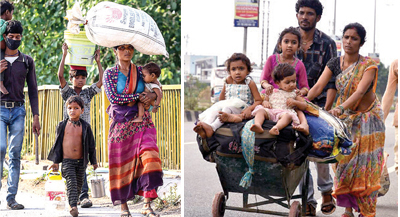
Corporate Citizen Claps For The 81-Year-Old ‘Benevolent’ Corona Warrior, Karnail Singh Khaira, Head Of The Dera Kar Seva Gurudwara Langar Sahib
 Karnail Singh Khaira
Karnail Singh KhairaKarnail Singh Khaira, has fed an estimated two million and more travellers and migrants, free of cost, during the national lockdown phase. For Khaira ‘Babaji’ as he is fondly called by the locals, feeding travellers is an everyday affair for the ‘sevaks’ of the small ‘Guru ka langar’, located on the NH7 on a 450 km stretch of a remote tribal region on the Yavatmal (Maharashtra) highway. The ‘Gurudwara Langar Sahib’ is historically linked to the famous Gurudwara Bhagod Sahib, some 11 km away near Wai. In the absence of any decent eatery in the adjoining 150 km to 300 km, most travellers halt all year round at Khaira Babaji’s ‘Guru ka langar’, identified by a plain tawny board indicating the presence of the ‘Gurudwara Sahib’ with its dilapidated tin shed with plastic sheets on the dusty highway. “We had hordes of people coming daily and we kept continuously cooking food for them. We welcomed all with smiles and folded hands, irrespective of caste, religion. My regular team of 17 ‘sevaks’, including 11 cooks and other helpers were overworked, but ensured a non-stop supply of fresh, piping hot food,” said Khaira Babaji. Close to 15 lakh people were fed at the remote langar in the course of 10 weeks and around five lakh food parcels were also distributed. While weary travellers have been treated to breakfast with tea, hard bread, and biscuits, their meals comprised of plain rice, dal, and potato dishes, they were also supplied with soap and borewell water for bathing. His compassion for animals resulted in feeding chapati and jaggery daily to around 250 dogs, cats, stray cattle, in the locality too. Babaji has had the support of his US-based brother, Baba Gurbax Singh who pooled in sizeable overseas donations from the local (US) Sikh community and Pandharkawada philanthropists like Pawanjit Kapoor, Salim Jetani, and Kishore Tiwari, to constantly kindle the fires of ‘Guru ka langar’. Two donation boxes encourage voluntary offerings but, the money is never counted and ploughed back into the daily running of the ‘langar’. Kudos to Babaji and his altruistic team!
Corporate Citizen Slaps For The ‘Shattered’ Dreams Of Young Children And Their Hapless Migrant Parents As They Recoil Back From Their ‘Big’ City Aspirations To Seek Out A New Life Amidst Uncertainties In Their Native Villages

The death of the 12-year-old child who managed to walk 100 kilometres from Telangana’s Bhupalpally district to her native Chhattisgarh village of Bijapur, yet, failed to reach home barely 11 km away, signalled just one aspect of the upheavals that these children have unknowingly been thrown into. Children of migrant workers and their saga of the exodus from the cities, post the national lockdown has flagged off shocking incidences and issues that go beyond the estimations of socio-economic dynamics and their right to live. Neeraj, the 8-year-old son of Shyam Babu, a migrant worker, has had his dreams of ‘urban’ schooling crashed as his father had to ‘let go’ of their 8 years of city life at Gurugram that had primarily focused on his education. “Neeraj got admission in a government school here. His fees and meals were taken care of and we were happy that he will get a good education and will not have to work as a labourer when he grows up,” said Babu. With no job security, compounding room rentals and his wages pending, Babu has had to take the difficult decision of heading back to his village in Bihar. Rickshaw puller Tirath Kumar, has a similar tale as he too had migrated from Bihar’s Sheikhpura district with the aim of educating his children in a ‘big-city school’. “A rickshaw puller can work anywhere, but we chose to do it in a big city so that our kids get to study there. We have the same government schools there also, but teaching is good in city schools. I like it when my daughter talks in English fluently. She is smarter in maths too than her village friends,” said Kumar. Although determined to come back, he posed a question that while his daughter’s education could be manageable in the city with help from the ‘anganwadis’, who would ensure his job security? Diwan Raj, an ex-employee of a city catering firm resounds a similar concern as his two-month long wait post the lockdown has exhausted his savings. “My son’s school here is very good. They also sent sanitiser and masks for the whole family and the teacher explained to us on phone about the virus and precautions everyone needs to take. You don’t get all this in village schools. Children then struggle when they grow up. I wish I could do something to keep things as they were,” he said. With all three families awaiting a chance on the Shramik special train - symbolises the agony and ecstasies of human survival at its worst best!